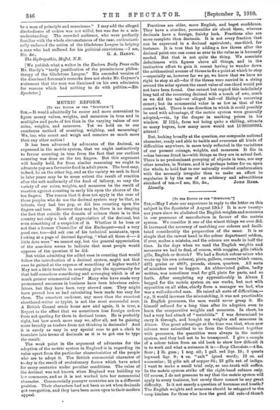METRIC REFORM.
[To THZ EDITOR OP THE " SPECTAT011.")
Sra,—It would admittedly be easier and more convenient to figure money values, weights, and measures in tens and in multiples and parts of ten than in the varying values of our coins, weights, and measures. Yet we hold on to our cumbrous method of counting, weighing, and measuring! We, too, who count and weigh and measure so much more than any other nationl It has been advanced by advocates of the decimal, as expressed in the metric system, that we ought instinctively to favour counting in tens from the fact that our earliest counting was done on the ten fingers. But this argument will hardly hold, for from similar reasoning we ought to advocate pap as a favourite food in adult years. The boot may, indeed, be on the other leg, and as the variety we seek in food in later years may be to some extent the result of reaction after the soft uniformity of the food of infancy, so may the variety of our coins, weights, and measures be the result of reaetion against counting in early life upon the abacus of the ten fingers. The reason that it does not apply in the case of those peoples who do use the decimal system may be that, as infants, they had lees pap, or did less counting upon the fingers and toes. However that may be, there is no denying the fact that outside the domain of science there is in this country not only a lack of appreciation of the decimal, but even something of a suspicion of it. Whether it be true or not that a former Chancellor of the Exchequer—and a very good one, too—did ask one of his technical assistants, upon hoking at a page of decimal figuring, "what all those d— d little dots were" we cannot say, but the general appreciation of the anecdote seems to indicate that most people would approve of the question if he did.
But whilst admitting the added ease in counting that would follow the introduction of a decimal system, might not that ease be gained at the expense of something of higher worth ?
May not a little trouble in counting give the opportunity for that half-conscious considering and arranging which is of so much greater commercial value ? Many who have made very pronounced successes in business have been laborious calcu- lators, but they have been very shrewd ones. They might have proved less so had calculating been made too easy for them. The smartest reckoner, any more than the smartest shorthand-writer or typist, is not the most successful man. A British Consul sends home now and again, it is true, a Report to the effect that we sometimes lose foreign orders from not quoting for them in decimal terms. He is probably right, but how much more may we, after all, not be gaining more broadly as traders from not thinking in decimals? And it is surely as easy in any special case to get a clerk to translate into terms of decimals as it is to get one to type the result.
The weak point in the argument of advocates for the adoption of the metric system in England is in regarding its value apart from the particular characteristics of the people who are to adopt it. The British commercial character of to-day is the result of evolutionary forces which have acted for many centuries under peculiar conditions. The value of the decimal was not known when England was building up her commerce, and so it is not worked into her commercial character. Commercially younger countries are in a different position. Their characters had not been so set when decimals got recognition, and they have been more open to their modern appeal.
Fractions are older, more English, and beget confidence. They have a sturdier, yeomanlike air about them, whereas decimals have a foreign, finicky look. Fractions also are more complete than decimals. It is not every fraction that can be expressed in a decimal equivalent; one-third, for instance. It is true that by adding a few threes after the decimal point one can come as near to the value as is humanly needed. But that is not quite the thing. We associate definiteness with figures above all things, and in the instinctive effort to gain it resent having to wander down the arithmetical avenue of threes to fix a point at which to stop —especially as, however far we go, we know that we have no right to stop at all—for if the threes were carried in a string around the solar system the exact value of one-third would yet not have been found. One cannot but regard this indelinitely long tail of the recurring decimal with a touch of awe, much as we did the tail—or alleged tail—of Halley's recurring comet; but its commercial value is as low as that of the comet's tail. There is one direction in which it could possibly be used with advantage, if the metric system were generally adopted,—viz., by the draper in marking prices in his window. If Md., from not being quite a shilling, attracts so many buyers, how many more would not 11.99999999d. attract !
But, looking broadly at the question, our composite national character, ready and able to tackle and overcome all kinds of difficulties anywhere, is more truly reflected in the variations of our present coinage, weights, and measures. It fits in —has become fitted in—with things as they are in actual fact. There is no predominant grouping of objects in tens, nor any other number, in Nature, and it is perhaps better for us, upon the whole, to hold fast to our naturally evolved conformation with the normally irregular than to make an effort to regularise it by the use of an arbitrary and adventitious
standard of ten.—I am, Sir, &c., Total Raw. Llanelly.










































 Previous page
Previous page